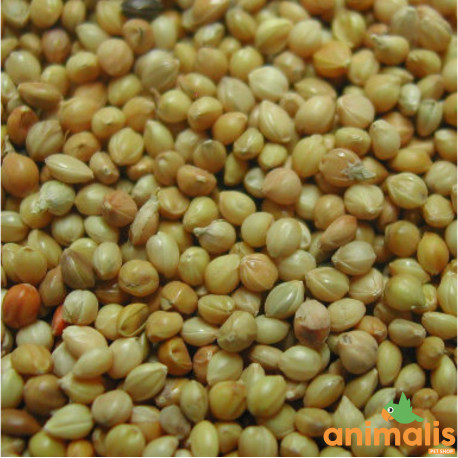



Reference: PANISJAUNE-KG
The canary seed is a grass, an annual plant up to 1m tall, the seeds being found in the inflorescences. These seeds make up a significant fraction of the majority of bird mixes.
• Excellent for canaries, European and exotic birds, wavy parakeets and large parakeets.
Soybeans are an excellent source of iron, zinc, manganese, copper, selenium, potassium, vitamins, fiber, polyunsaturated fatty acids and antioxidants, in short, it is an excellent dietary supplement.
Soybeans are often used in sprouting seed mixes.
The thistle-Marie seed has hepatoprotective properties. It is therefore excellent for our birds to avoid liver problems as a preventive measure.
Grass seed is very low in fat, it is ideal for small exotic birds and siskins, but it is suitable for all birds.
Chia is a sage. It is an annual plant that can reach up to 1 meter in height, with the scientific name Salvia hispanica.
The composition of chia seeds closely resembles that of other mucilaginous seeds like flaxseeds and psyllium. Unlike flaxseeds, chia does not have anti-nutritional factors, which limit the use of flaxseeds without prior heat treatment. Anti-nutritional factors are cyanogenic glucosides or linatins, inhibitors of vitamin B6 that prevent its action. Moreover, chia has a much more pleasant taste than flaxseeds, and birds consume it more readily.
Rosehips are wild roses, whose rose hips are eaten in the fall, which are very rich in vitamin C.
The evening primrose is an annual or biennial, rustic, which can be found naturally at the edge of paths near the Atlantic and Mediterranean coasts but also on the embankments of railways. Its erect stems are lined with large rosettes of downy leaves veined with red, between 10 and 30 cm long, oblong in shape, lanceolate, toothed, a little sticky.
Cardi seed is rich in protein and linoleic acid, which helps lower cholesterol levels and therefore reduce heart disease. It is found in parakeet and parrot mixes but also in native birds such as bullfinches.
Cardi seeds are high in fat. The amino acid proportions of the seed are very favourable, the arginine content is very high. The seed is low in lysine and methionine + cystine, while tryptophan is completely lacking.
Striated sunflower is the basic seed of any parrot mixture. It is also used in mixtures for parakeets and exotic doves.
It is also the favorite food of your outdoor birds during the winter period! Ideal for feeding the birds in your garden.
Practical information for giving sunflower seeds to birds in your garden:
Remember to regularly clean the feeders of your outdoor birds so that diseases and bacteria do not thrive.
Also consider setting feeders high up to prevent predators (such as cats, foxes, etc.) from targeting birds when they are eating.
These seeds rich in lipids and proteins are especially appreciated by wild birds. They will attract sizerins, reeds, goldfinches, black-headed chickadees, sparrows, sad doves and a host of other birds to your garden. It is often used as a replacement for the more expensive shuttle.
Seed rich in protein, mainly present in pigeon mixes, appreciated by pigeons.
The milk thistle seed has hepatoprotective properties. It is therefore excellent for our birds to prevent liver problems.
The green Pagima ensures the good health of your birds. Pagima green promotes the functioning of the intestines, thus ensuring better digestion. Pagima is also credited with a preventive action against inflammations of different types that threaten your birds, it is rich in vitamins and fiber, its smell is pleasant and its taste delicious.
Chicory seeds (cichorium intybus) are among the health seeds that come from wild plants. These seeds are rich in fiber and minerals and allow intestinal balance.
They purify the body and are also effective in case of indigestion.
Seeds for canaries and exotic and native birds.
Peeled sunflower seeds are suitable for your budgies and parrots but also for straight beaks that live in outdoor aviaries in winter.
Sunflower seed contains almost 40% fat, but also proteins, carbohydrates, vitamins B and E. We quantify on a sunflower seed nearly 600 Kcalories per 100 g.
It satisfies throughout the year, the needs of a wide variety of birds, including the smallest of them.
Sunflower seeds are a real treat for our birds who love them!
No waste, no waste! The garden stays clean!

